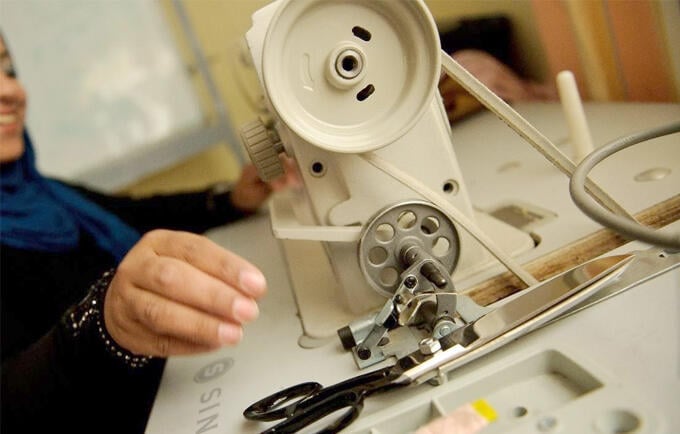Salma is a 21-year-old young woman living in Za'atari refugee camp. She is an independent fashion designer from Syria who sews and embroiders her own creations for her clients. She uploads her work via smart phone into WhatsApp, while raising 3 young children and attending a wide range of youth development activities at UNFPA/Questscope Youth Center. Salma's father passed away when she was only two, and because of that, and due to the traditions followed in her hometown, she got engaged at the age of 11; the same year she fled the war in her country. She ended up getting married at 14. Consequently, Salma didn’t just become a victim of forced child marriage but also was living in challenging conditions, since living in a refugee camp comes with certain hardships. However, Salma was eager to learn and was ready to engage with her community. When she heard from her friends about the UNFPA-supported Questscope Youth Center in Zaatari camp, she reached out and registered in the mandatory course on sexual and reproductive health (SRH), and gender-based violence (GBV).
“I really needed a change in my life, and the youth center’s activities were the perfect fit, as they suited my lifestyle as a housewife. Indeed, I was encouraged by the trainers' constant support, as well” Salma commented.
Moreover, Salma was an active and very distinctive participant in the art classes she took at the center, including the course on fashion design, where she found great passion for, and later on pursued a career in it. However, in March 2020, when COVID-19 restrictions required closure of all activity venues, the center’s doors were also shut. Nonetheless, 22 youth Syrian volunteers who manage and run the center were able to transfer activities to virtual platforms with the support of teams from both UNFPA and Questscope. Salma used her smartphone for online sewing and design training. She also continued her learning about SRH rights and GBV topics via an online whatsapp group, which was facilitated by the center’s trainers. These virtual services enabled Salma to balance her life commitments, livelihood activities with her personal development and networking needs that are fulfilled through the Youth Center. When Salma reflects on her participation at the center, she thinks of it as a transformational process that has empowered her to to believe in herself and have an outlet for creative expression.
The UNFPA/ Questscope Youth Center, titled “Space for Change”, was launched in Za'atari refugee camp in 2013. UNFPA, in collaboration with Questscope support an inclusive and an open space led by 27 Syrian refugee male and female youths residing in Za'atari camp. The aim of the center is to ensure that the most marginalized youth are not left behind. The center pays special focus on youth’s sexual and reproductive health and rights (SRHR), GBV topics, youth peer-to-peer education and empowerment. Also, it provides youth participation platforms through youth-led initiatives. Furthermore, all new youth mentors participate in a one-week mandatory training course on SRHR and GBV topics.
The center reaches approximately 1500 young people per year aged 10-30 through annual interventions and youth services including sports, arts, music and mentorship programmes. In 2019, the Youth Center launched a comprehensive program to promote youth-led initiatives under the name “Creativity Fund”. The Creativity Fund supports specialised training on assets-based approaches for creating youth-led initiatives and small “seed funding” activities. The themes of the initiatives vary, as they tackle issues and causes that are of refugee youth concern. In fact, %40 of the initiatives focus on addressing issues related to GBV, including child marriage.
UNFPA in Jordan is working towards improving young people’s ability to exercise sexual and reproductive health and rights in both development and humanitarian settings. The support for the “Space for Change” center is a commitment towards promoting innovative approaches for knowledge transfer on SRHR and GBV among Syrian refugees’ adolescents and youth.


